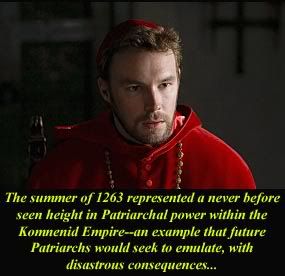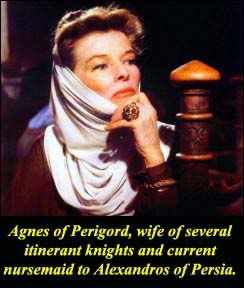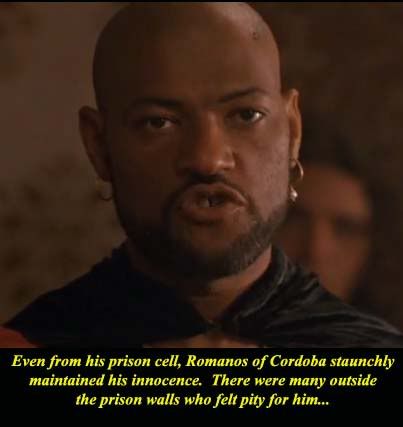Because of the horribly slow nature of my temporary internet connection, the graphics in this update aren’t up to my usual standard. I apologize. My old laptop I’ve dragged out and brought to a temporary wifi location simply isn’t up to snuff. Hopefully, hopefully, the internet situation will resolve itself. Until then, please bear with me.
Thank you.

==========*==========
From Lynn Hunt’s Chi Rho in Power: Understanding the Relationship Between Christianity and Empire, Terre d’Louis University Press, 1994:
…Truly, Patriarchs had held a great deal of power before. They had rallied the city’s defenses while emperors hid quivering in their chambers, and served as mouthpieces for discontent. But never had a Patriarch wielded as much power and authority as Thomas Komnenos found thrust on his shoulders that summer in 1263. With the Emperor incapacitated and the
Megoskyriomachos unpopular and jailed, the Patriarch seemed the only person capable of stepping into the power vacuum. And step Thomas Komnenos did. Within weeks of the apparent vacuum, he’d pronounced any commander, official or private citizen who uttered words against Emperor Andronikos or his government not only guilty of treason, but also guilty of a mortal sin against the Will of God. He swept aside many of the more corrupt officials, with church-trained men replacing them. When the commander of the
Thrake Stolos demanded more pay for himself and his sailors, the Patriarch uttered that they would obey their sovereign emperor, or be faced with damnation.
They ceased their complaints.
Only one force was powerful enough to seeming tide of ecclesiastical power—the army, led by its triumphant
Megos Domestikos, Romanos of Cordoba.
By every right, Romanos expected a triumph on his return to Konstantinopolis after the successful conclusion of the Spanish campaign. He had supervised the largest Roman military operation since Thomas II’s confrontation of Genghis Khan with far more successful results. In addition to this, by all the records we can find, Romanos of Cordoba was a loyal, dependable commander…
…until his ship landed on Corfu on June 30th, 1263. It was here that Romanos, as well as the other senior staff of the Spanish campaign that had not sailed ahead (like Konstantinos Komnenos), first learned of the poisoning of Emperor Andronikos.
Immediately Romanos called a Council of War. The leading commanders of the Hispanikon Stratos that remained, including Theodoros Komnenos and Simon Angelos, were all in attendance. Sadly, if there was any record of what was said, it has been lost to history. Various biographers and historians have taken sides as to what the results of the conference were. Gennadios Psellos adamantly claims that Romanos
et al were planning on a coup to install someone else as Emperor, while Prokopios Gabras staunchly saids that Romanos was the victim of a smear campaign. Whatever the results, Romanos sailed ahead of the army with a small escort, arriving in Konstantinopolis on July 7th, 1263.
Both Gabras and Psellos agree that on the
Megos Domestikos’ arrival, there was no fanfare, no crowds waiting for him on the docks. Instead, there was a retinue of the
Hetaratoi in full martial gear. Gabras claims that Romanos disembarked, demanding to know what the harsh welcome meant, while Psellos claims the
Megos Domestikos attempted to flee back on the deck of his flagship, only to be captured. Duly arrested in the name of Patriarch Thomas Komnenos on charges of treason against the young Emperor, Romanos was led, in chains, to the dungeons below the Kosmodion Palace.
The fate of the
Megos Domestikos soon became public scandal throughout the city—many assumed that if the Patriarch had acted, that surely there must have been a plot. Others spoke quietly of Justinian and Belisarius, but none opened their mouths against the arrest. Few could go against the words of Patriarch Thomas Komnenos. In a mirror of what had once briefly taken place in the West, Church ruled State, and the populace of the Queen of Cities was left to watch and wonder as Romanos was led away in chains. Truly, it seemed, the world had turned upside down.
If only they had known what was truly afoot…
=========*==========
July 12th, 1263
Agnes de Perigord sighed in the heat of Isfahan. Despite the umbrella held above her graying hair and the slow beat of servant’s fans, the heat and the flies were oppressive and unceasing. Part of her still cursed her final late husband, an errant lord who’d come to Persia as an
archepolitikos in search of a new life. Only the high-pitched, off-tune whistle of the child next to her kept her mind away from those nuisances—if only because it was a greater nuisance itself, though no one would dare call the current Crown Prince of the Persian Empire such a thing.
Not even his nursemaid and official minder.
Eight year old Alexandros Komnenos the Younger was a spitting image of the state his father co-ruled, a blend of Roman and Persian. He’d inherited his father’s fair skin, but his mother’s eyes, narrow nose, and thin frame. His version of
Basil Meets the Moor was off-key as a child’s whistling was prone to be, with shrieking notes replacing anything remotely high.
“Are you wincing?” he asked, the noise suddenly stopping. Agnes didn’t nod her head, nor did she glare. She stared ahead, resolute, firm, refusing to admit anything.
“Fine I shall stop,” the boy huffed. Agnes didn’t smile, but neither did she frown as the true noises of the Isfahan market finally reached her ears. The relative peace of hawkers and merchants howling their wares came to a crashing halt when the boy grabbed her sleeve and tugged with all his might.
“Look at that cloak!” he shrieked, instantly grabbing the attention of nearly everyone within earshot. By unspoken command, the servants, guards and other retainers immediately came to a halt behind the pair. Agnes sighed yet again, eyeing the bright, nearly eye-searing purple cloth and its gold trim.
“And a purple bolt of silk!” he announced, already on his way over. “That would make a lovely tunic!” he announced, well on his way to the merchant at hand.
“You should be frugal,” Agnes harrumphed as she surrendered and followed her charge. “It is what your mother would want.”
“And what
I want,” the boy snapped, “is the purple bolt of silk with trim” he announced, “as well as the cloak!”
Agnes sighed, fighting to bite her lip as her duty and her sense of right clashed. Her sense of how a noble child, the son of a ruler was to be raised screamed for her to cuff his ears and tell him no, to force him to learn frugality and prudence—traits desirable in any boy destined to one day rule a great kingdom. Instead, her duty and pledge to her mistress, Empress Theophano of Persia, bid her give in to the boy’s demands.
After all, her duty was to make Alexandros, eldest son of the brother of the senior of the Komnenid Persian brothers, ineligible to take the crown.
Alexandros and Nikephoros had gotten along splendidly in joint rule, but Theophano didn’t know if their
sons would as well. Nikephoros and his wife had yet to bear a son—only two daughters, Zoe and Theodora. Theophano was intelligent enough to know the infamous history of Komnenid cousins and the desire for power—any son from her loins would be younger than either of Alexandros’ sons, with a several years head-start to build a powerbase against her own heir. It didn’t help that the child Alexandros was clearly very intelligent, moreso than his simpleminded brother, Isaakios.
Empress Šahrzād had many reasons to be opposed to Theophano’s wishes, but she went along. She envisioned her boy becoming a great scholar, a mind gifted and inclined to run the bureaucracy that the Persian Komnenids were building to match their western cousins. Poetry, art, science, these were the purviews she saw for her son. She too knew of the Komnenid propensity for family blood, and she saw the bureaucracy as the safest place for her son—and the best place from which Persian culture could thrive next to the Roman in this new, bold future.
It was thus that the two empresses came to their accord, an accord made with the grudging consent of their husbands. Šahrzād’s eldest would be made ‘ineligible’ by his education, while her next son, Isaakios, was trained normally ‘just in case’ Theophano failed to bear an heir. Theophano had even graciously agreed that Agnes, a lady-in-waiting in her court, be made the boy’s nursemaid. It was thus that in the name of perpetual peace between the two Gabrieline branches, that Alexandros the Younger needed to be raised in the least regal way they could imagine.
As a girl.
Starting a few months before, he was to be spoiled rotten, introduced to fashionable clothing instead of blades, fine silks and furs instead of hardened leathers and mail. When he was at home, other members of Agnes’ staff had even gone as far as to blush his lips and pepper his face with rouge. Agnes couldn’t bring herself to commit that final indignity, and was secretly glad the young boy had not gone so far as to like the cosmetics of a lady. However, he had developed a fine sense of entitlement, a tendency to stomp his foot, and a propensity for tantrums. Agnes only hoped he wouldn’t develop the ‘affliction of Nikolaios,’ but it was far too early to tell…
“It will be ruinously expensive,” Agnes chided. Purple was the color of emperors for a reason—it was incredibly rare, with a price to match.
“And we’ll use money I’ve saved up!” the boy announced imperiously. “Papa said that the money from selling those three horses he had went to
me.”
“Yes, but Beatrice said…”
“I didn’t spend all of it!” the boy laughed, interrupting her. “I spent 500 buying a horse that Master Sphratzes recommended—he said he could make more horses if he found a mare to go with the stallion. I still have 500 left!”
Agnes closed her mouth as quickly as she’d opened it. Beatrice had complained the horse merchant was trying to sell the steed for a thousand pieces of gold, and that she’d had to drag her young charge away, Alexandros all the while complaining and saying he was going to head back straight away with Master Sphratzes, the Palace Horsemaster. Someone, somehow, had managed to get the merchant to lower the price. The boy beamed—she put her hand to her head.
He was going to be insufferable for the next few days.
“If you have the money…” she sighed, waving her hand in defeat.
“Young master, I just heard you mention you have 500 gold!” the merchant crouched and smiled. “Normally this cloak would be sold for 750…”
“I want the cloak, as well as the bolt of purple silk here,” Alexandros pointed, “
and those leather boots!” Agnes peeked from behind her fingers to see a set of small leather boots with fur trim. They would be horribly hot in the Persian summer, but Agnes had to admit, they would look striking. Even on an eight year old.
“Ah, very well, young master, but the price of all of that is…”
Clink went a large bag of coin onto the merchant’s table. “500 gold,” the boy asked, “and my nursemaid telling everyone at the palace you are a good man to buy boots and cloaks from?” Little blue eyes stared up at the merchant’s brown—Agnes couldn’t resist the urge to grin ever so slightly.
So
that’s how he’d managed to do it!
She ruffled the boy’s head. For despite mistresses’ expectations,
she had seen to it Alexandros was getting a proper education on the side—on the orders of the boy’s father and grandfather, no less. Trips to the garment markets of Isfahan had become clandestine visits to swordsmiths, excursions to the makers of lace were in fact trips to a quiet field outside the city for practices. Where Šahrzād saw a keen mind capable of great things in government and scholarship, the elder Alexandros and more importantly Emperor Gabriel saw a mind capable of far more…
The merchant blinked, before a smile of understanding came across his face. “Of course, of course, young master!” the man grinned. Quickly the cloak, bolt of silk, and boots were on the counter. “You tell them that Hosni Daryani is my name, and an honest merchant I am! Good prices, and good selection!”
Agnes snapped her fingers, and two servants immediately had all the items save the cloak carefully bundled.
“Now, young master, would you like to try on the cloak?” the merchant asked.
Alexandros quickly had the cloak about his shoulders, before moving his arms about as if in a graceful dance. He twirled, the purple shimmering in the sunlight as he spun about. He moved his arms again, in that same graceful motion, and grimaced when the cloak got caught at his knees. To the untrained eye, he appeared to be merely dancing. Agnes’ eyes, used to watching each of her three former husbands at practice, recognized someone effortlessly performing sword strokes with no blade.
“I needs some cuts on the side,” the eight year old said stiffy. “It’s too tight to do a good swing,” the boy pronounced, before looking up at his nursemaid. “What do you think, Lady Agnes?”
“I would agree,” she nodded. It was a beautiful piece of clothing, but it was slightly too wide and clearly impeded his movements.
“Down to there?” the boy mused, drawing a line with his finger some six inches long. Agnes nodded—yes, his eyes were sharp despite his age. The cuts he wanted might have been a little longer than her husbands might have done it, but it was good—the boy had caught the needed changes. At her nod, Alexandros handed the bolt of silk back to the shopkeep, giving him instructions with cheery, childlike words. The merchant nodded, occasionally looking over at Agnes, who urged the man onwards.
Within the hour, the two were walking down the street, guards and retinue in tow, a brilliant lavender cloak trimmed in gold flowing from the boy’s shoulders. He talked excitedly of wearing it to the next spar, and how it could distract his opponents. Agnes merely smiled, and sighed—she was looking forward to the spar as well.
It’d be a chance to rest after chasing the little ball of energy known as Alexandros the Younger all around Isfahan…
July 14th, 1263
Romanos of Cordoba yawned, but when he tried to stretch, chains held his arms from reaching their full length.
The
Megos Domestikos sighed. He’d seen wars, invasions, dearth and plenty, but never had he imagined
this—being chained, without charges, without reason, in the basement of the
Kosmodion. He’d been a good general, a loyal officer, why was there any reason for His Emperor to fear him? Yet somehow, instead of a parade and cheering crowds, he’d been greeted by the grim ranks of the
Hetaratoi, drawn up in ranks, with orders to capture their titular commander.
He wasn’t sure how long it’d been since that day. He guessed it was close to three weeks. Plenty of time to sit and wonder, time to try to figure out whose web he was caught in, and what they intended to do with their prey. It was today, as sunlight streamed through a thin grate far above, that Romanos finally thought he’d figured out who his tormentor was.
Patriarch Thomas Komnenos.
Romanos hadn’t been fully abreast of every theological development, but as any good
Megos Domestikos he had kept a thumb on the political heartbeat of the great empire. From the thumps and bumps of rumor and gossip, the Patriarch, despite his professed lack of interest in politics, had been the source of a great deal of political ruckus long before his foray into investigations.
Ever since Thomas Komnenos had penned his
Opinions on the Role of God in the State, it’d seemed inevitable that he and
Megoskyriomachos Albrecht von Franken were on a collision course of some sort. The Patriarch wanted a state more godly, less worldly, with holy men playing a far more important role than the abjectly secular state run by von Franken. Von Franken had countered bluntly that men of God should stick to preaching and teaching, not doling out grain or counting coin. The split in opinion had quietly started dividing the court—the Church versus the
dynatoi, with the army either aloof or stuck in the middle.
Never in Romanos’ life would he have thought, however, that the disagreement would erupt into the Patriarch
arresting von Franken on charges of witchcraft!
Nor had he ever imagined he would be swept up in the matter.
It was purge, Romanos knew. Yes, he’d called a Council of War on Corfu, but the plans were simply to secure the capital city in the name of Emperor Andronikos, and then find out who his lawful representatives were. None of the commanders present had even
hinted at the idea of a rebellion, or seizing the throne! Yet the Patriarch was using this vacuum to sweep away all things von Franken and replace them with figures more loyal to his viewpoint. Romanos of Cordoba had been the most prominent of a series of army appointments by the von Franken regime, and the most illustrious who did not have the title of Prince or
thematakoi to back up his military title by force.
So, here he was. He sighed, shifting the chains yet again. He winced—the clinking and clanking were noises he still wasn’t used to. His first few nights here, he’d sat awake for long hours, wondering what his fate would be. However, as the hours went by, he relaxed more. No guardsmen beat him, spat at him, or tore his clothing. Ioannis Angelos, evidently part of the Patriarch’s investigation, had questioned him, but the young man had been quiet, respectful, and always brought food with him when talking to his former commander.
So now Romanos sat here, yawning, thinking of something far different. Why was he here? Was he being fattened up, set into a sense of false security so he would be more ripe for the slaughter? Was he merely a stooge? Was he…
…sleep took him gently.
The noise of keys jangling woke him with a start. He opened his eyes, blinking in the dim torchlight.
So it was night.
Amidst the dancing shadows of the torches, he saw a dark figure—a man in a cloak, hood drawn over his face. The man walked up to the bars of Romanos’ cell.
“General,” the hooded man nodded.
“Who are you?” Romanos squinted through hooded eyes. He started to rise, and his arms and legs complained. While the jailers had been remarkably kind to him, he’d still been loosely chained to the wall. The lack of motion for the past few days showed.
“A friend,” the hooded figure responded, before flashing his hand out. A ring glinted in the light. Romanos leaned forward. In the dim torchlight, the
Megos Domestikos thought he made out the shape of a cross, with a letter in in each quadrant.
He blinked.
Angelos?
“I come to say there are those who know your innocence, and will do whatever they can to protect it,” the man went on. “Hold your head high, and keep your wits about you,” the man added, withdrawing the jeweled hand as quickly as it’d been offered. “Your day of innocence will come, and those that unjustly accused you shall receive their own justice.”
“Who are you?” Romanos asked again. Simon Angelos? Konstantinos?
The man nodded his head and raised his arm in the faint echo of a salute, before swiftly disappearing back into the shadowy hallways from whence he came. Keys jangled once more in the distance, and with a final clang, Romanos was once again alone.
==========*==========
July 20th, 1263
Konstantinos Komnenos was not normally one to be caught in the sweltering heat of a Thracian summer, and he was he wore the light linen tunic and breeches he wore today. Servants swatted away fat, lazy flies, he sipped on some chilled wine, as thankful for its cool taste as he was for the servants’ slow fans.
“No, boy!” he sat up quickly and barked, the suddenly movement raising several flies from their torpor into a blaze of movement. In the midst of the courtyard of his Konstantinopolis villa, his youngest son Michael looked up worriedly, only halfheartedly gripping the reins of his first horse. As Konstantinos growled at the boy’s poor form, his erstwhile companion still sat lazily under the canopy of servant fans, chuckling.
“The boy is eight,” Konstantinos grumbled, “yet he holds the reins like they were some kind of burden!” He settled back into his chair with a paternal harrumph.
“It’s a shame about the
Megos Domestikos,” his companion continued the conversation so rudely interrupted by bad horsemanship. “They said he stood there dumbly why the
Hetaratoi arrested him!” Another chuckle. “Poor bastard, taking the fall…”
“Like you mind,” Konstantinos snorted, before taking another sip of wine. He might have much to complain about his urban residence in the capital, but its cellars were top notch at keeping wine cool. “His arrest makes the Patriarch look like an arbitrary fool, and keeps everyone’s eyes off of you and your friends.” It was Konstantinos’ turn to chuckle. “Save mine.”
“Pardon?” the man asked.
“So that was some stunt you pulled a few weeks ago,” Konstantinos started to grin, before his the edges of his lips suddenly curled down. “No!” he barked at his youngest son, “you have to hold your back
straight, don’t slouch, else the horse will not feel you as its ruler!”
“I thought you’d appreciate me using your own creature to do the deed,” the man took a swig of his wine like the barbarian he was.
Konstantinos snorted slightly—the Easterners certainly didn’t know how to drink wine properly. Konstantinos carefully sniffed his goblet, and swirled it around a bit before taking a sip, just like he’d been taught in the West.
“It was amusing,” the Italian said, partly in approval, mostly in envy. A stab at the imperial throne had been at the heart of Konstantinos’ plans for years—but not until he had the money, the authority, and the backing of the army. The campaign against Segeo had given Konstantinos the opportunity to plunder the first, secure the second, and build up the third—yes, he’d only seen a few skirmishes in the war, but the Italian knew how to play the game like few others. Already, troubadours were about paid in his coin to spread stories of his prowess in the field, while other
solidii made sure his soldiers stayed well supplied with food and drink. “I wouldn’t truly call him
my creature. I called him out for who he was, then planned on using him later. You merely made your play before I could make mine.”
“And what play is that?” the other lord asked over his wine. On the polo field, Michael was gingerly urging his horse to a canter. The beast snorted, and bucked slightly.
“Hold the reins
tightly, boy!” Konstantinos frowned again, “they aren’t snakes, they shan’t bite!” The boy nodded quickly, nervousness plain in his eyes, as Konstantinos growled, then turned back to his companion at the table. “Your friend’s attempt at the throne,” he replied, before grinning. “Thought
attempt is hardly a suitable word. Assault, would that be more appropriate, or more…foreshadowing?”
“Possibly,” the man looked nonplussed. “If you’ve figured out my little plan, then I’m little more than a cooked goose.”
Konstantinos frowned. “Why do you say that?” the Italian asked, harsher than he intended. Was he being insulted?
“Because if a man who can’t teach his sons how to ride has unraveled my plan, certainly von Franken will, even from a prison cell,” the man grinned before sipping his wine. “And as we know, that man can conjure defenses from nothing. Which, incidentally brings me to the point of my visit to your…” his eyes drifted around the courtyard, as the shouts and screams of hawkers outside the gates filled the air, “…quaint country estate?”
Konstantinos’ fought to make his face pleasant. He
was being insulted. He started to complain that he wouldn’t let himself be talked to like that, but he bit his tongue. It’d be impolitic. “Which is to beg my support, I assume?” he threw in a slight barb of his own. “I don’t see why I should…”
“This is merely a courtesy, Konstantinos,” the man said simply. “There are those among us who think you should be...removed. There is an opinion that once we have established our regime you’ll merely try to become another Leo.”
“Pssh,” the Prince of Toscana snorted. “Removed? How? I have the backing of the
Italikon Stratos and all the legions thereof. You couldn’t…”
“We have allies in every Eastern army of note,” the man went on in a dreadful deadpan, “One might say we have the
Anatolikon Stratos within our power.”
“The
whole of the
Anatolikon?” Konstantinos his voice arced up against his will. The sudden urge to swallow filled his throat.
“And possibly a good half of the
Basilikon,” the man nodded, only the thinnest of smiles crossing his lips. “More than enough to accomplish the deed, even after we have pushed the Persians aside.”
Konstantinos felt that lump in his throat grow as he went over the information he was privy to as a principal commander.
Tagmata numbers, strengths, the likely routes of march of both the man, now calmly sipping his wine once more, as well as the man’s likely allies and master. The lump finally forced its way down his throat, and Konstantinos coughed.
“I shall be blunt,” the man sat up, eyes filled with a calm tempest, “you stand no chance against us. We
will take the throne in Konstantinopolis of our own accord. We could count you as a valuable ally, someone that could make the inevitable far more… convenient?” the man’s eyebrows arched up. “Or, we can take the throne the longer, more difficult route, which would result with your head on a pike.” The man leaned close, very close, until his hazel eyes loomed large in Konstantinos’ sight. “So, Konstantinos, will you join us?”
So a lot’s happened! The
Megos Domestikos has been arrested, but has been offered hope by someone he believes is a part of the Angelos family. Meanwhile, Konstantinos finds himself given an offer he can’t refuse by an unknown party who is using the Persian invasion as a pretense. Meanwhile, Alexandros the Younger of Persia has shown himself to be a quite peculiar little boy.
Agnes de Perigord is a cameo from my friend Drake Rlugia’s
Jeanne d’Anjou: Chronicle of a Queen. It’s the story of how a young girl is learning to come to grips with being a queen and an adult woman, and has all the promise of a wonderful tale in the making. I’d urge all of you to go take a look!
More to come, hopefully with better illustrations and more internet access, when Rome AARisen continues!










